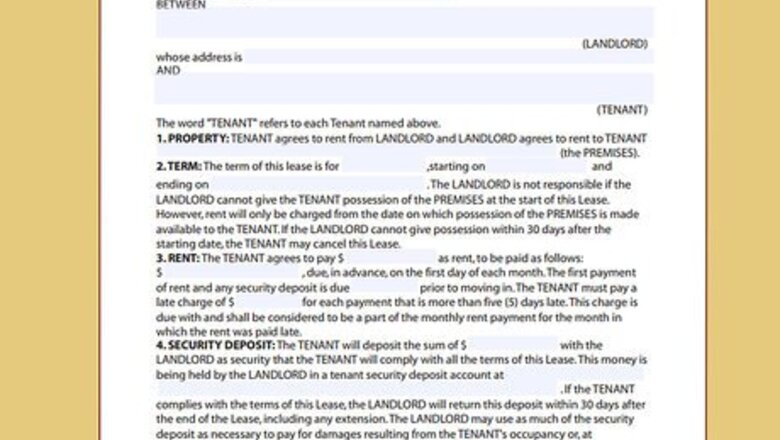
views
Assessing the Situation
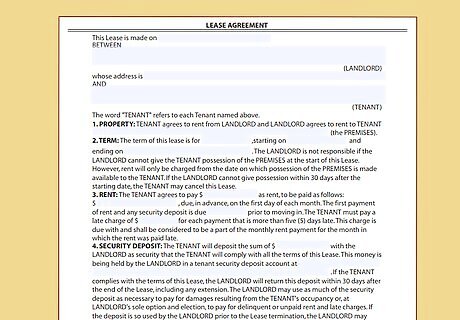
Know your rights by reading your lease or HOA rules. If your community has a governing board, browse their bylaws, too. Look for rules and regulations that your neighbor has specifically broken or disobeyed. If you aren’t sure where to find your neighborhood or apartment complex rules, contact your homeowners association (HOA) or landlord for a copy. Get familiar with local and state laws, too. If your neighbor is trespassing, for example, that’s breaking the law.
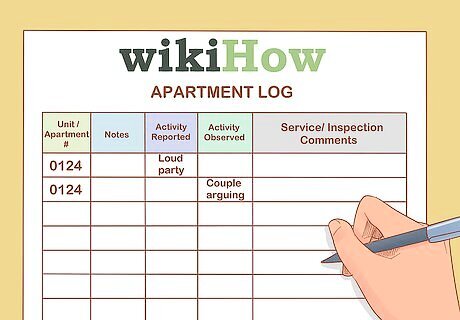
Keep a log of every incident that occurs as evidence. Each time your neighbor breaks a rule or bullies you, write it down in a notebook or track it in an Excel spreadsheet. Be as detailed as possible and include information like the date, what happened, and how it impacted you. For example, an entry might look like: “August 2: Neighbor was blasting rock music at 2 a.m. I couldn’t sleep as a result.” Note any actions you took such as asking them to turn the music down. Even if you don’t plan to go to court, keeping track of your neighbor’s offenses is helpful to take with you to your landlord or HOA.
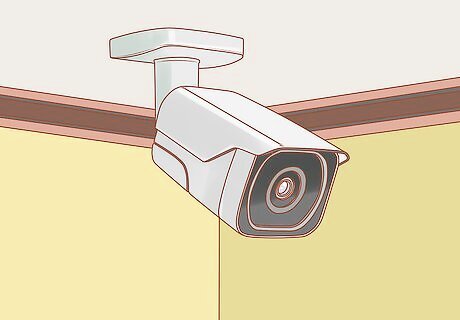
Set up a surveillance camera outside your home to record any issues. Train the camera on any areas where the incidences occur. For example, if your neighbor keeps dumping dog poop in your backyard, place a camera on the back deck overlooking the entire yard. Save the footage on a hard drive to refer back to later on. Check the video surveillance laws in your state before installing a camera. These vary greatly. In some states (like Rhode Island, New York, and California), you cannot put cameras in places where people have a “reasonable expectation of privacy,” which includes bedrooms, bathrooms, and anywhere people get undressed. You don’t have to install a fancy surveillance system. Look for affordable cameras online or at an electronics store.
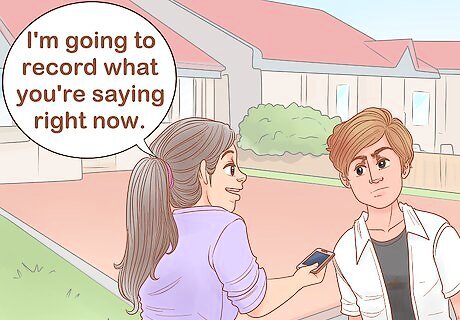
Record your neighbor with your phone’s voice recorder. Do this if your neighbor is verbally abusing you or if you want proof that you confronted them about an issue. Because the laws on audio recording are stricter, tell your neighbor before you begin recording that you plan to do so. They need to verbally consent to being recorded. Say something like, “Just to let you know, I’m going to record what you’re saying right now.” If they ask you not to record them, you have to respect that right and turn off the recorder.

Ask your other neighbors if they’re experiencing a similar problem. Are you the only one who seems to have an issue with this neighbor? Talk to others in the community to find out. If multiple people are unhappy with the neighbor’s behavior, you’ll have more leverage when you confront the neighbor in question. Use your best judgment when approaching other neighbors. Don't come across as the person stirring up drama or gossiping behind backs. Try to bring the topic up casually in conversation to feel out how the other person will react. For example, you could say, “Sorry I’m late. Jim’s car was blocking our parking spot for the fourth time this week.” See how they respond to your comment about the car. If they don’t mention it, move on. But if they’re dealing with the same problem, they’ll likely continue the conversation. If you find you’re the only dealing with the issue, take a minute to make sure it really is an issue. Is your neighbor really being too loud or are you just tired and overstressed from a crazy week at work? Figure out if the problem is worth pursuing further or if it’s something that’s more you than them.
Talking it Out
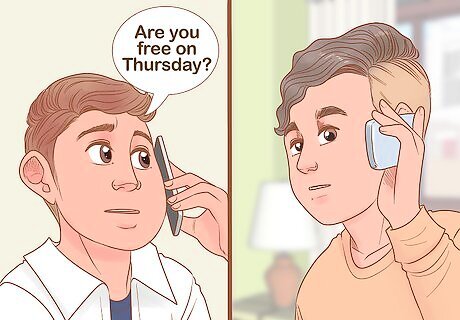
Schedule a time to talk face to face if possible. This isn’t a conversation to have on the fly, nor is it appropriate to do via text, email, or written letter. Call your neighbor on the phone and ask if there’s a time you can get together for 15 to 30 minutes to chat. You don’t have to tell them the reason for your meeting. Keep it vague. Say something like, “Hi, I was wondering if you’re free for a few minutes on Thursday evening to get together.” Suggest meeting at a neutral place like a coffee shop or neighborhood park. Never discuss tricky issues like these over text or email unless absolutely necessary. Even if your neighbor refuses to meet with you or if your schedules don’t match up, try your best to at least have the conversation over the phone.

Communicate clearly what the issue is and why you’re upset. Don’t assume that your neighbor knows what they’re doing wrong. Be as specific and honest as possible, while still being respectful. Explain what happened, when it happened, and how it affected you. Be straightforward and to the point. Summarize your main concerns in 2 to 3 sentences. Don't ramble on and on, and give the other person space and time to respond, as well. If your neighbor is skeptical or doesn't take you seriously, show the record of incidents you’ve been keeping track of as proof. Bring a copy of your lease or the neighborhood rules to show your neighbor so they’re aware that this is more than hurt feelings or pettiness… it’s a real violation.

Use “I” statements to avoid accusing the other person. Blaming your neighbor for everything that’s going wrong will likely put them on the defensive. Try to lessen the blow and foster more positive communication by describing how their actions make you feel, using a sentence that starts with “I.” For example, instead of saying “You keep parking on our lawn and it’s ruining our grass!”, say “I feel frustrated when you park on our lawn because I spend a lot of time and money taking care of it.” At first, “I” statements feel unnatural. Practice a few phrases before you talk to your neighbor so you’re prepared.

Be assertive and maintain eye contact when talking. Bullies capitalize on other people’s weaknesses. Stand up straight, be confident, and speak with a firm, steady voice to show you aren’t afraid of them. Assertive does not mean aggressive. Don't yell, raise your voice, or intimidate your neighbor. If you find yourself on the verge of getting emotional, try to focus on your breathing. Taking deep breaths can help you remain relaxed and articulate your feelings in a calm, respectful manner.

Suggest solutions that are mutually beneficial for both of you. Come prepared with a list of 2 to 3 ways to resolve the problem to make the conversation more productive. Go over each of them and provide actionable ways to implement them. For example, if your neighbor is constantly cursing at your kids when they’re playing outside because they don’t like the noise, one solution could be to set up a playtime schedule. Actions to take would include alerting your neighbor when the kids will be outside so they can leave the area if it bothers them, along with giving them your number to call if things are getting too loud instead of harassing your kids. Be open to compromise. You aren’t the only person involved in this issue, so don’t expect that it’s going to be your way or the highway. Your neighbor will likely have some ideas for solutions so stay open-minded and discuss those, as well.

Stay calm and composed to avoid worsening the issue. A bully wants to push your buttons and cause a reaction, so don’t engage when they try to provoke you. Take a few deep breaths and keep your cool, even if the other person lashes out. Getting worked up affects your judgment and makes you act irrationally.
Getting a Third Party Involved
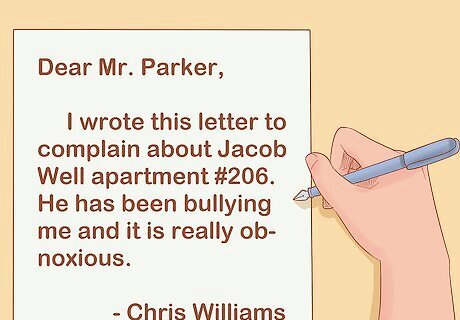
Notify your landlord or homeowners association of the issue in writing. Even if you have mentioned the problem to your landlord or HOA verbally, write a letter or send an email specifically stating what is going on, along with any steps that have been taken so far in an attempt to correct it. Not only will this let them know the details, it will also serve as proof later on if you do go to court. Print out your log of incidents to include with your letter or attach it to the email. Some organizations or boards may have an official process for submitting complaints so check with someone in charge to find out if that's necessary.
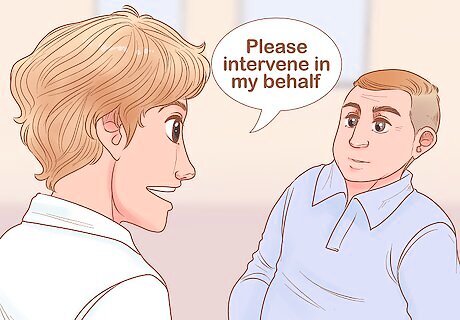
Ask your landlord or HOA to intervene on your behalf. If you already tried to talk to your neighbor (or if you don’t feel comfortable doing so), request that your landlord or HOA handle the issue. They have more governing power and authority so they're typically more effective in resolving problems faster. Especially in apartment complexes, management companies often actually prefer that you let them address bad behavior. They have processes in place for residents who violate rules which may include eviction or termination of a contract. This helps avoid any awkwardness that you feel confronting a neighbor multiple times. After all, you do have to live with them!
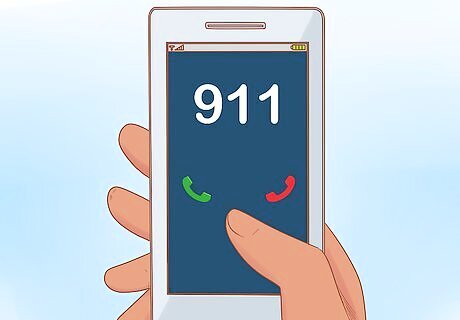
Call the police to drop by if you’re feeling unsafe or need immediate help. Threats, physical violence, erratic behavior, or even a refusal to turn down the music at 3 a.m. all warrant a call to the local police station. They'll come assess the situation and, if need be, make an arrest. A police visit may scare your neighbor into stopping their bullying behavior. Unless it truly is an emergency (like you’re being attacked), call the non-emergency phone number instead of calling emergency services on 911, 999 etc. Find the appropriate number on your police department’s website.
Taking Legal Action

Consult a lawyer to determine what your options are. Before you even think about going to court, find out if you even have enough of a legal case. Find a local lawyer who specializes in neighborly disputes and schedule an appointment to talk through the problem. They’ll be able to help guide you in the legal process and determine the best course of action to take. Come to your meeting prepared with your log of incidents, your lease or homeowners association contract, and any other important documents that could help build your case. Understand that litigation is a time-consuming and costly process. Make sure you’re ready to commit a lot of hours and money to it before you jump in.

Try mediation first to resolve the issue outside of court. In mediation, you’ll sit down with a third-party mediator who will lead a conversation about the issue. You'll each get to share your point of view and then the mediator will talk you through different solutions and their pros and cons. Once you agree on a solution, the mediator will document it in writing so you both have a record of it. Having an unbiased mediator referee the discussion helps decrease hostility between the two of you. These mediators are specifically trained in conflict resolution. Mediation is much cheaper than litigation. A lot of states and local governments even offer free mediation services. Because mediation is voluntary, your neighbor would have to agree to attend the session out of their own will. Your homeowners association or apartment management company can usually provide you with phone numbers for mediation services.
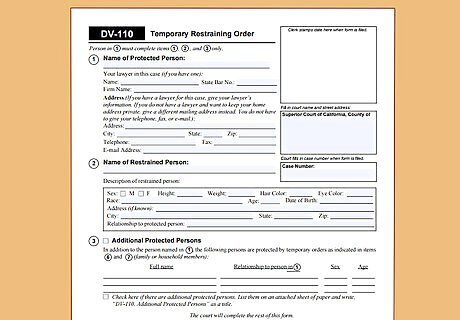
Request a protection order if your safety is threatened. A protection order (also known as a restraining order) can only be filed if your neighbor is arrested and there is a pending criminal case. File the necessary paperwork with the court, then attend a hearing where the judge will determine the parameters of the restraining order. Protection orders are issued if you're being stalked or harassed or if your neighbor is threatening you with physical violence. In many cases, you won't have to pay a fee to file your request for a protection order. Check with your local court to find out if you qualify for a fee waiver.
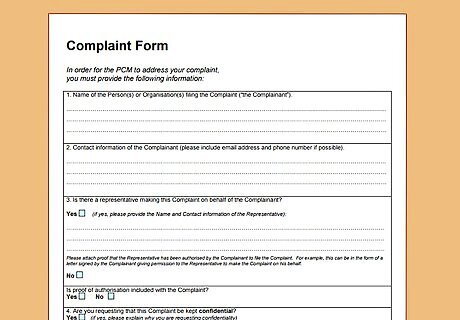
File a lawsuit invoking the law of nuisance in small claims court. This is one of the most common lawsuits for neighborly disputes when your neighbor acts in a way best described as being a nuisance. File a complaint with your local court, then attend the hearing scheduled for your case. At the hearing, you'll receive an injunction, which is an order from the judge on how to correct the issue. For example, if your problem is a neighbor who stands outside your house to smoke everyday, the injunction may be that they must be 50 feet (15.2 m) away from your house to smoke. You may also sue the landlord or your HOA if they were aware of the issue but did nothing to correct it. You're paying the lawyer to navigate this process for you so rely on their best judgment and legal knowledge to make sure you go through the right channels for filing.

Collect damages for any harm that was caused. Damages are a sum of money you're awarded if you win a lawsuit. If the judge orders damages to be paid, your neighbor will be responsible for paying you that money. Damages can be compensatory or punitive. Compensatory damages pay the person who was injured. For example, if you missed work because of your neighbor's bullying behavior, compensatory damages could include payment equivalent to your wages for those missed days. Punitive damages are designed to punish the person who was wrong. In this case, that's your neighbor. If punitive damages are awarded, the judge will request that your neighbor pay you a determined amount of money.



















Comments
0 comment